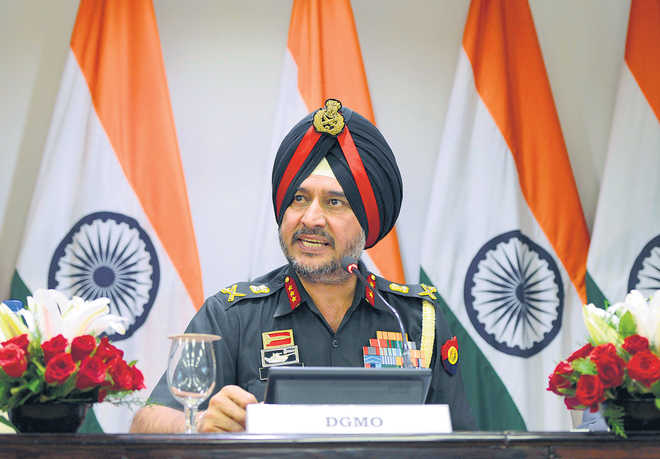Strikes as odd
Pravin Sawhney

The Gamble: There was concern that the strikes may evoke massive retaliation.
Pravin Sawhney
ON September 29 last year, following the unprecedented admission by India that its Special Forces (SF) had conducted “surgical strikes” inside PoK, I had three immediate observations on the operation. One, it was extraordinary to admit operations by the SF and to announce that there “were no plans for further continuation”.
These operations — which are meant to influence the political and war-fighting levels — are never admitted, leaving the enemy guessing about more. Two, SF action is rarely done at tactical level because influencing a battle does not alter war. And three, if the action had indeed been done, retaliation, perhaps a massive one whose escalation could not be controlled, was inevitable.
Given that the Indian military, especially the Army, was not prepared for war, the political leadership appeared to have gambled.When Pakistan denied India’s surgical strikes, I was befuddled. This was completely out of sync with its tit-for-tat strategy to maintain military balance with India.
For example, Pakistan did its nuclear tests to demonstrate “strategic balance” with India; it test-fired its ballistic missiles in the 1990s each time India tested its own; it brought tactical nuclear weapons in the war narrative to counter the Indian Army’s Cold Start doctrine, and so on.My unease about Pakistan’s unexplained reticence was quieted soon. Speaking with the Parliament Committee on External Affairs within weeks of the strikes, Foreign Secretary S Jaishankar said the strikes were “target specific, limited calibre, counter-terrorist operations across the LoC which the Army had done in the past too, but this is the first time the government has gone public about it”.
Clearly, in connivance with the Army leadership, the Modi government had taken the nation for a ride. It had deliberately confused SF action with counter-terror operations. The two are as different as day and night. While SF action is always done against legitimate military targets (in this case, the Pakistan army) to minimise collateral damages; counter-terror operations are meant to kill the terrorists, who are faceless, nameless, dispensable, and do not influence Pakistan army’s strategy to continue the proxy war.If anything, the counter-terror action — where India undermined its SF by employing them in a specialised commando role — reinforced the General Headquarters, Rawalpindi’s resolve to continue with gusto. This is borne out by government statistics: While 36 Army personnel were killed between January and September last year (this includes the 19 charred in the Uri attack), 69 have died so far since the surgical strikes.This besides, a bigger damage has been done by the Indian Army to itself. In a recently published book (the foreword has been written by Gen Bipin Rawat), the Army has confirmed what ideally should have been the best-kept secret.
According to a chapter in the book, India’s entire leadership was deeply involved in what were a series of tactical operations meant to be executed without fanfare by local brigade commanders with the 15 Corps Commander in Srinagar being in the loop. This included the Prime Minister, Defence Minister, National Security Adviser, the Army Chief and the Vice-Chief. Clearly, the low-level operation was only meant to showcase PM Modi as the macho man.What’s more, according to the book, “a total of 38-40 terrorists and two Pakistan army personnel were killed at the four targets. The three separate teams (each with 19 men) had simultaneously struck four launch pads (temporary camps where terrorists are given final instructions before infiltration) across the LoC.” These details contradict Lt Gen Ranbir Singh’s media briefing of September 29, 2016, that “at least seven launch pads were targeted… And significant casualties have been caused to the terrorists and those who are trying to support them.” Now, killing two Pakistan army personnel cannot be “significant casualties” for the 13-lakh strong Indian Army pitted against the six-lakh Pakistan army!This is not all.
The book tells us why Lt Gen Ranbir Singh betrayed extreme anxiousness at his media briefing by saying that he had informed his Pakistani counterpart (within hours of the operations) about the details of the operations. The worry clearly was about Pakistan army’s scale and scope of retaliation and India’s inability to cope with it should it enlarge into the nightmarish two-front war in whatever fashion.So, the book unintentionally reveals what the Army intended to hide. Instead, it conceals the details of the Indian SF team’s action inside PoK. The Indian Army is chary about dishing out this information without realising that, post-event, the Pakistan army knows it. What it does not know, and always seeks to find out is the state of morale and preparedness of India’s military. The book, by mentioning how the entire Army leadership was nervous about escalation, gives away its level of preparedness.Were any lessons learnt by the Indian Army? None, if the then Northern Army Commander, Lt Gen DS Hooda’s (retd) recent interaction with the media is anything to go by. The surgical strikes, according to him have, “in some ways, shattered the glass ceiling.
The Special Forces have gained tremendous confidence in their ability to execute a complex operation in very hostile territory.” To recall, in the 90s, well before the Indian Army erected the Maginot Line (which represents defensive mindset) in the form of the fence on the LoC in July 2004, regular Army commandos rather than Special Forces, used to regularly breach the so-called glass ceiling. Raids on Pakistani posts, killing of its personnel and vice-versa by surprise attacks and artillery fire were so commonplace that long silence by one side was reason for the other to worry.
The lessons that we should learn are that only war preparedness and disallowing the political leadership to use military for its own partisan, rather than national objectives, will deter Pakistan and boost the morale of our soldiers.
http://www.tribuneindia.com/news/comment/strikes-as-odd/474476.html
Leave a Reply